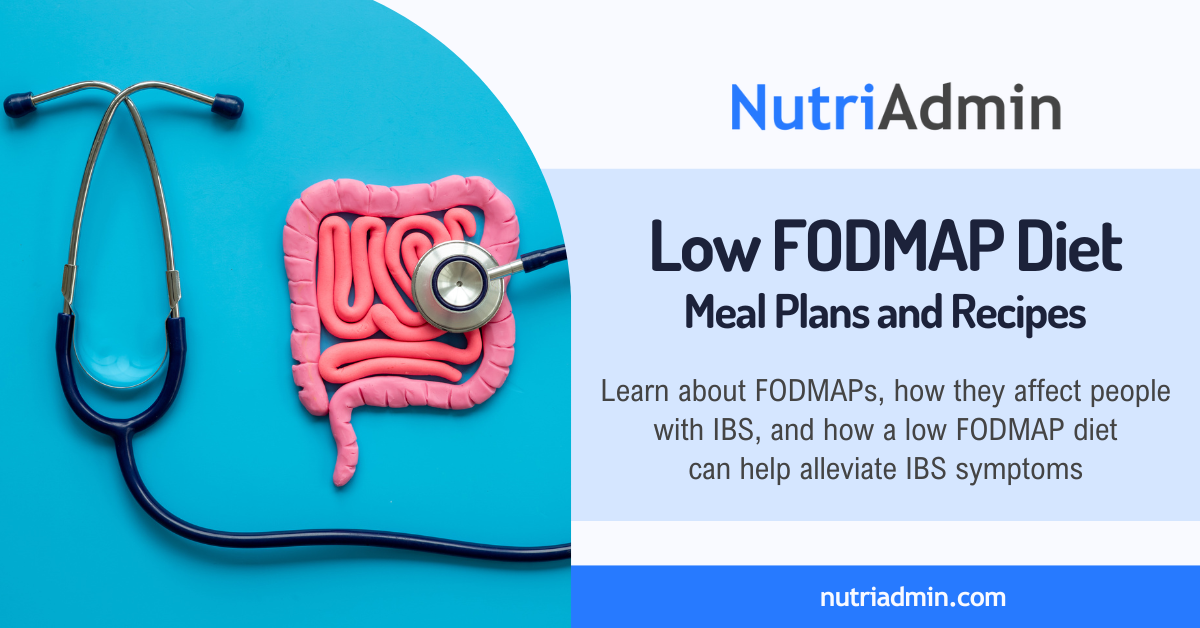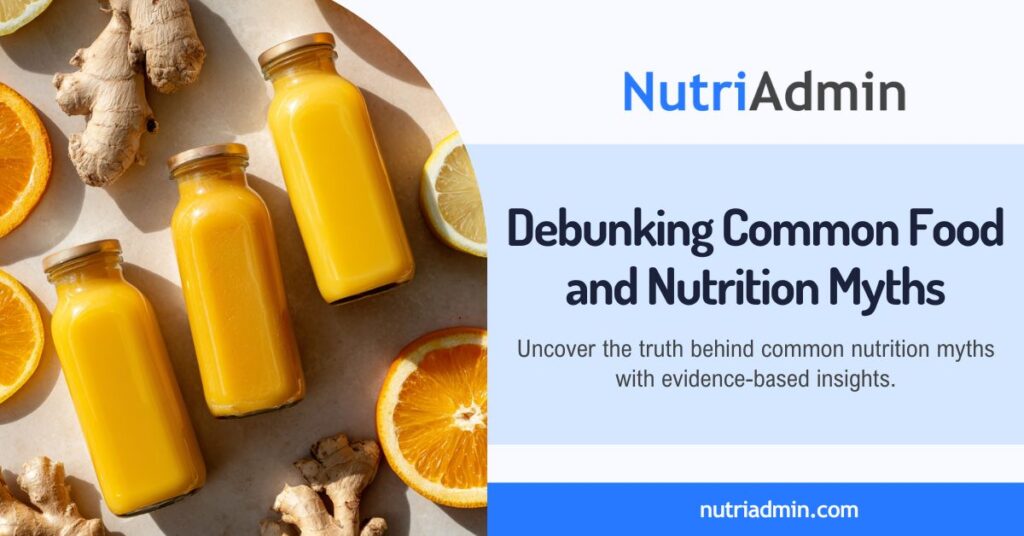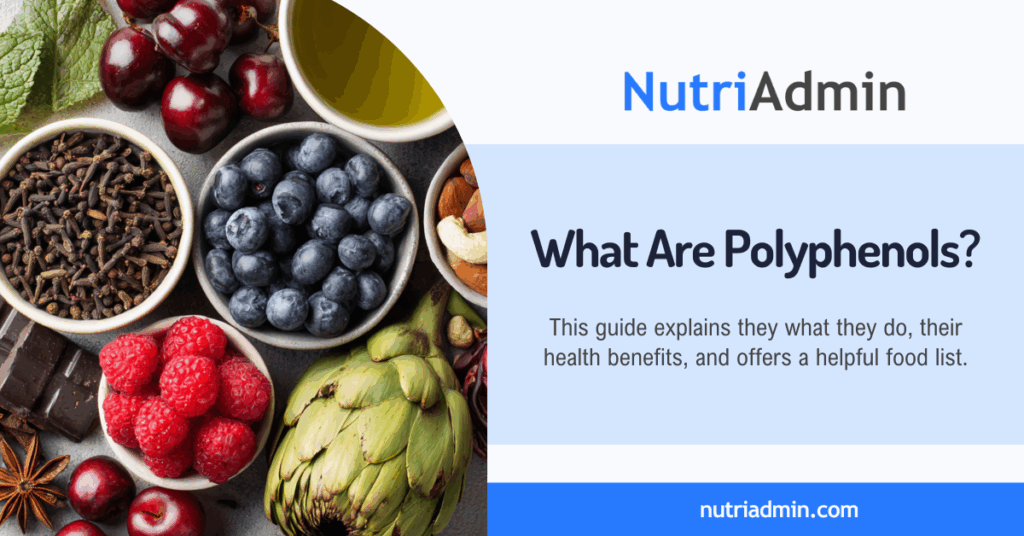Irritable Bowel Syndrome (IBS) affects about 5-10% of the global population. As nutrition professionals, it is important for us to understand IBS and be able to help clients who suffer from this chronic condition.
This is where the low FODMAP diet, designed to alleviate IBS symptoms, comes into play. In this article, we’ll simplify everything you need to know about this IBS and the FODMAP diet, including a low FODMAP meal plan and recipes. You will also learn which foods are high or low in FODMAPs.
What are FODMAPs?
You have likely heard of someone feeling gassy after enjoying a hearty helping of beans, whether it’s a family member, a friend, or even yourself. Have you ever wondered why this happens? Understanding FODMAPs might help explain this.
FODMAPs are a group of short-chain carbohydrates that some people may find hard to digest or are not easily absorbed in the small intestine. The term FODMAP stands for:
- Fermentable
- Oligosaccharides
- Disaccharides
- Monosaccharides
- and
- Polyols
How do FODMAPs affect the body?
FODMAPs are highly fermentable carbohydrates, meaning that when they pass through the digestive system, they are not effectively absorbed during digestion.
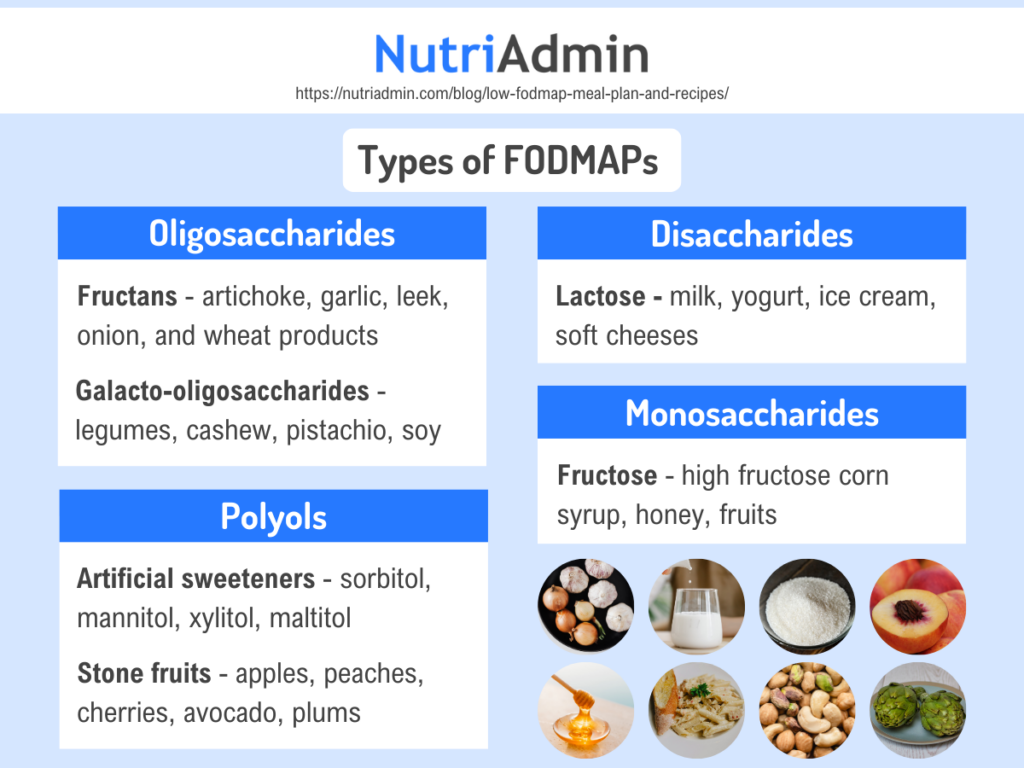
Upon reaching the large intestine, FODMAPs are fermented by bacteria, leading to the production of gas and various chemicals. This fermentation process can cause the walls of the colon to stretch, resulting in symptoms such as abdominal bloating, distension, cramping, pain, and changes in bowel habits.
Although FODMAPs negatively affect some people, it is not inherently unhealthy or harmful, but they can potentially worsen gastrointestinal symptoms in individuals with sensitive digestive systems.
IBS and Low FODMAP Diet
Irritable Bowel Syndrome
Irritable bowel syndrome (IBS) is a group of symptoms that occur together, including repeated pain in the abdomen and changes in bowel movements, such as diarrhea, constipation, or both. IBS is a functional gastrointestinal disorder related to problems with gut-brain interactions, causing increased gut sensitivity and changes in bowel muscle contractions.
The symptoms often appear and then disappear. They may persist for varying lengths of time, ranging from a few days to several weeks or even months. Living with irritable bowel syndrome (IBS) can be a lifelong challenge that greatly affects everyday life. The condition can be frustrating to deal with and has a significant impact on daily activities.
Cause
The exact cause of irritable bowel syndrome (IBS) is not known, but several factors can contribute to its development. Some of these factors include abnormal gastrointestinal motility, gut-brain axis dysfunction, post-infectious inflammation, changes in gut bacteria, and genetic predisposition. Additionally, psychological factors such as stress, anxiety, and depression can also play a role in the development and exacerbation of IBS symptoms.
Treatment
While there is currently no known cure for irritable bowel syndrome (IBS), there are ways to alleviate its symptoms and improve quality of life.
These include making dietary changes, such as adopting a low FODMAP diet, taking prescribed medication, and incorporating probiotics into your daily routine. Stress is a major risk factor for IBS and may cause flare-ups. Research studies have confirmed that managing stress can have positive results on IBS symptoms.
Low FODMAP Diet
The low FODMAP diet was developed by researchers at Monash University in 2005. On it, individuals with IBS avoid high FODMAP foods and opt for low FODMAP alternatives. However, the researchers do not recommend using this diet for the long term.
Although a low FODMAP diet is an important part of managing Irritable bowel syndrome (IBS), it does not cure the condition. Instead, it helps alleviate its symptoms by reducing the intake of certain types of carbohydrates that can trigger digestive discomfort.
Three Phases of the FODMAP Diet
We often hear about the low FODMAP diet, but as mentioned earlier, it is not suitable for long-term use. In fact, it is just the initial step in Monash University’s 3-step FODMAP diet.
This diet has been proven to help 75% of individuals with IBS manage their symptoms. Several studies based on long-term follow-up have also indicated that the FODMAP diet can be effective, safe, and sustainable when properly implemented.
However, of course, not every single person is the same. Some people may not experience improvement by following the FODMAP diet. You should consider other dietary triggers such as:
- dietary fiber
- gluten
- caffeine
- fat
- dairy
- alcohol
Step 1: Low FODMAP Diet (Elimination)
The first phase of the FODMAP diet involves eliminating high FODMAP foods and substituting them with low FODMAP options. This phase typically lasts for 2-6 weeks.
Step 2: Reintroduction
During the second phase of the FODMAP diet, you gradually reintroduce high FODMAP foods over a period of 8-12 weeks. This process helps to identify which types of FODMAPs can trigger an individual’s IBS symptoms and which ones they can tolerate well.
Step 3: Personalization
Once you have finished the reintroduction phase of the diet, you should be able to recognize high FODMAP foods that can trigger IBS symptoms. Additionally, you should be able to assess which of these foods can be safely reintroduced into your diet on a permanent basis.
Low FODMAP Meal Plan and Recipes
Avoiding many food items can be difficult. In addition to nutrition counseling, offering meal plans and recipes can be helpful. These meal plans can serve as a practical guide for clients with IBS. They offer ideas on what to eat, potentially increasing adherence to the diet.
Low and High FODMAP Food List
It is important to know which ingredients can be included in recipes and meal plans that adhere to the low FODMAP diet. You can refer to the following food list as a guide. Alternatively, you can visit Monash University’s FODMAP Hub for a more extensive food list.
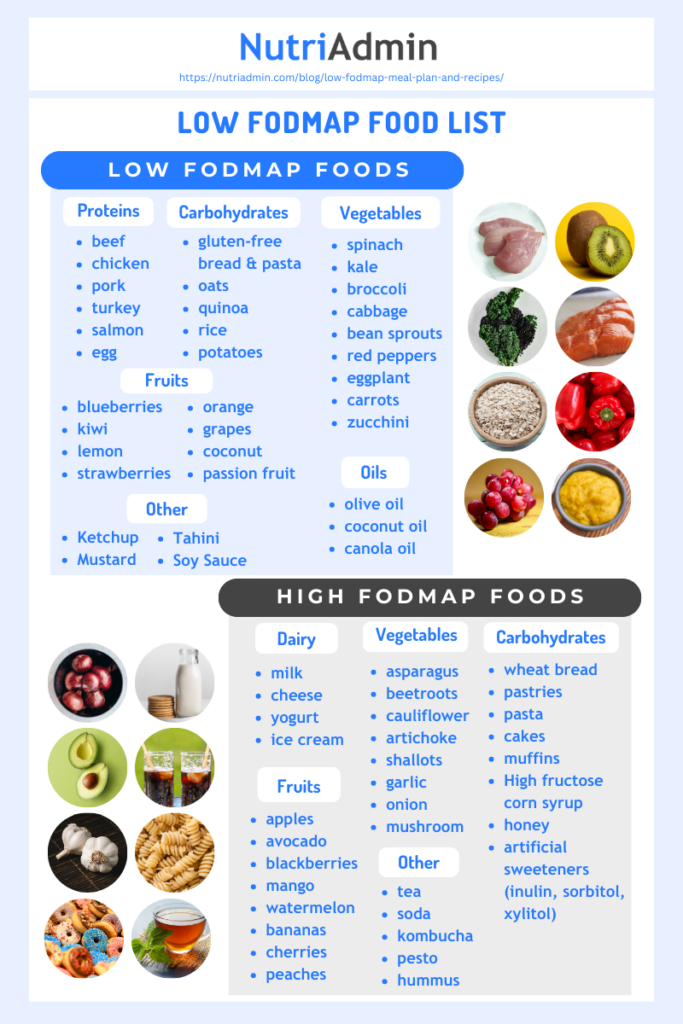
Creating Low FODMAP Meal Plans
As a nutrition professional, it can be challenging to create meal plans for clients with multiple dietary restrictions, such as the low FODMAP diet. If you specialize in managing clients with IBS, using software for nutritionists with meal planning features such as NutriAdmin would be an excellent addition to your business.
In NutriAdmin, creating individualized low FODMAP meal plans is easy, whether for the elimination part of the diet or the reintroduction of FODMAP-rich foods.
The meal plan generator lets you input parameters such as calories per day, macros, meal types, maximum ready time, cuisines, and more. You also have the option to exclude specific ingredients in case your client has additional allergies, intolerances, or food preferences.
Additionally, you can choose from over 40 diet filters for your meal plans, including the low FODMAP diet. The best part is that this can be done in just 60 seconds!
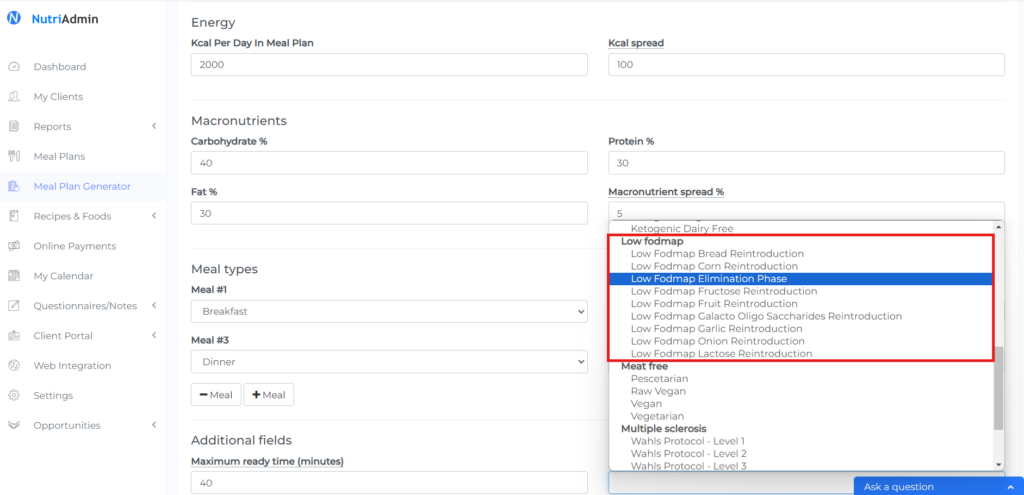
You can download the sample Low FODMAP elimination phase meal plan with recipes from NutriAdmin’s meal plan generator below.
Low FODMAP Recipes
In addition to creating personalized meal plans, NutriAdmin also provides access to a comprehensive recipe database. This feature allows you to find a wide range of nutritionist-vetted low FODMAP recipes.
Whether you’re looking for easy and delicious breakfast, lunch, dinner, or snacks, the database has a variety of options that you can recommend to your clients with different dietary needs and preferences.
Check out some sample low FODMAP recipes with nutrition analysis from NutriAdmin’s recipe database below.
Summary
Irritable Bowel Syndrome (IBS) is a disorder that affects the digestive system, causing symptoms such as cramping, abdominal pain, bloating, gas, diarrhea, and constipation. It can be managed through lifestyle changes, diet, and stress management.
The low FODMAP diet helps manage symptoms of irritable bowel syndrome (IBS) by reducing the consumption of certain carbohydrates known as FODMAPs, which can cause digestive discomfort. FODMAPs are short-chain carbohydrates that some people find hard to digest.
The diet has been shown to be effective for about 75% of people with IBS. However, the low FODMAP diet is not a long-term solution and should be personalized. This is why the FODMAP diet has a three-step process, which includes elimination, reintroduction, and personalization phases.
While the low FODMAP diet can significantly improve quality of life, it doesn’t cure IBS and should be implemented under professional guidance to avoid nutritional deficiencies.
